29 May 2020
Rock Gardens: Lisa Robertson and Yaniya Lee
-
Yaniya Lee
Yaniya Lee is a Toronto-based writer and scholar and Associate Editor at Canadian Art magazine. Her interdisciplinary research draws on Black studies to question critical-reading practices and reconsider Canadian art histories. She has an interest in community organizing and collective practice. Lee is a founding collective member of MICE Magazine and member of the EMILIA-AMALIA working group. She was previously on the editorial advisory committees for C Magazine and FUSE. Her writing has appeared in the FADER, NOW Magazine, C Magazine, Magenta Magazine and Adult. She has two chapbooks: Troubled (2014) and In Different Situations Different Behaviour will Produce Different Results (2013). Lee has also written exhibition texts for Walter Scott and Laurie Kang, and about the artistic practices of Tau Lewis, Divya Mehra and Hannah Black. From 2012 to 2015, Lee hosted Art Talks MTL, a series of long-form interviews with Montreal art workers. In 2016, she programmed “Labour, Land, and Body: geographies of de/colonialism” for Vtape’s Curatorial Incubator.
Read More
-
Lisa Robertson
Lisa Robertson is a poet and essayist from Toronto who currently lives and works in France. She has published several poetry books, essays and reviews and has been a visiting poet, lecturer and artist-in-residence at various institutions. Robertson’s poetry is known for its subversive engagement with the classical traditions of Western poetry and philosophy. Her subject matter is varied, framing poetic genres and philosophy with concepts of gender and nation, nature and womanhood and utopian impulses, as well as art, architecture, food and astrology. In the mid-1980s, Robertson studied at Simon Fraser University and became involved with the Kootenay School of Writing, a Vancouver-based writing collective, before running Proprioception Books (1988-94). Robertson has taught at the University of California San Diego, Capilano College, Dartington College of Art, the California College of Art and the University of Cambridge. Robertson continues to be one of Canada’s most celebrated and internationally recognized poets.
Read More
A Conversation Exploring Other Tangled Forms of Living Together
We gathered at the beginning of March, in what can only be described now as the last weekend of before – before the new normal of these isolated days – to celebrate the culmination of Beginning with the Seventies. For two days we shared ideas, meals, reflections, strategies for moving forward. The finale, Rock Gardens, was both an ending and a new beginning – this has become very clear in the weeks since as we shelter at home. Rather than give a reading, a form and practice that is familiar to the writer and the reader alike, Lisa Robertson and Yaniya Lee engaged in a performative offering. They sat across from one another at a small table, their gazes directed conversationally rather than towards the audience, and arranged a series of colour-coded index cards across the surface of the table. These indexes contained quotes, prompts, queries pulled in part from Lee’s chapbook Troubled (2014) and Robertson’s text “The Collective” (2017) – propositions for a confabulation to unpack and understand how to think about the things that propel them in their work and in our world. Each interlocutor would choose a card carefully and with deep consideration, read from it, and pose a question, a reaction, perhaps wonder or delight, as an invitation for response. We are posting the video documentation now to share in the experience as spectator and to encourage us all to carry on in our respective processes.
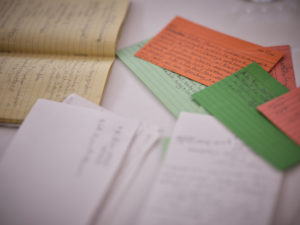
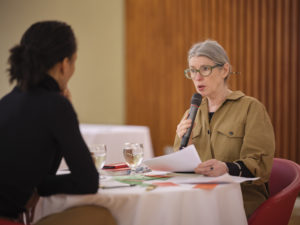
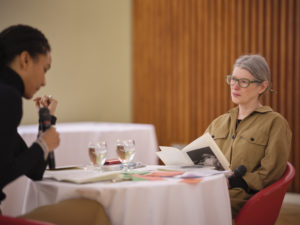
Images (above): Yaniya Lee and Lisa Robertson, Beginning with the Seventies catalogue launch and symposium, March 7, 2020. Photo: Rachel Topham Photography
-
Yaniya Lee
Yaniya Lee is a Toronto-based writer and scholar and Associate Editor at Canadian Art magazine. Her interdisciplinary research draws on Black studies to question critical-reading practices and reconsider Canadian art histories. She has an interest in community organizing and collective practice. Lee is a founding collective member of MICE Magazine and member of the EMILIA-AMALIA working group. She was previously on the editorial advisory committees for C Magazine and FUSE. Her writing has appeared in the FADER, NOW Magazine, C Magazine, Magenta Magazine and Adult. She has two chapbooks: Troubled (2014) and In Different Situations Different Behaviour will Produce Different Results (2013). Lee has also written exhibition texts for Walter Scott and Laurie Kang, and about the artistic practices of Tau Lewis, Divya Mehra and Hannah Black. From 2012 to 2015, Lee hosted Art Talks MTL, a series of long-form interviews with Montreal art workers. In 2016, she programmed “Labour, Land, and Body: geographies of de/colonialism” for Vtape’s Curatorial Incubator.
Read More
-
Lisa Robertson
Lisa Robertson is a poet and essayist from Toronto who currently lives and works in France. She has published several poetry books, essays and reviews and has been a visiting poet, lecturer and artist-in-residence at various institutions. Robertson’s poetry is known for its subversive engagement with the classical traditions of Western poetry and philosophy. Her subject matter is varied, framing poetic genres and philosophy with concepts of gender and nation, nature and womanhood and utopian impulses, as well as art, architecture, food and astrology. In the mid-1980s, Robertson studied at Simon Fraser University and became involved with the Kootenay School of Writing, a Vancouver-based writing collective, before running Proprioception Books (1988-94). Robertson has taught at the University of California San Diego, Capilano College, Dartington College of Art, the California College of Art and the University of Cambridge. Robertson continues to be one of Canada’s most celebrated and internationally recognized poets.
Read More
Related
-
Event
Fri 6 March 2020 at 5 pm
Sat 7 March 2020 at 1 pm
Book Launch and Symposium: Beginning with the Seventies
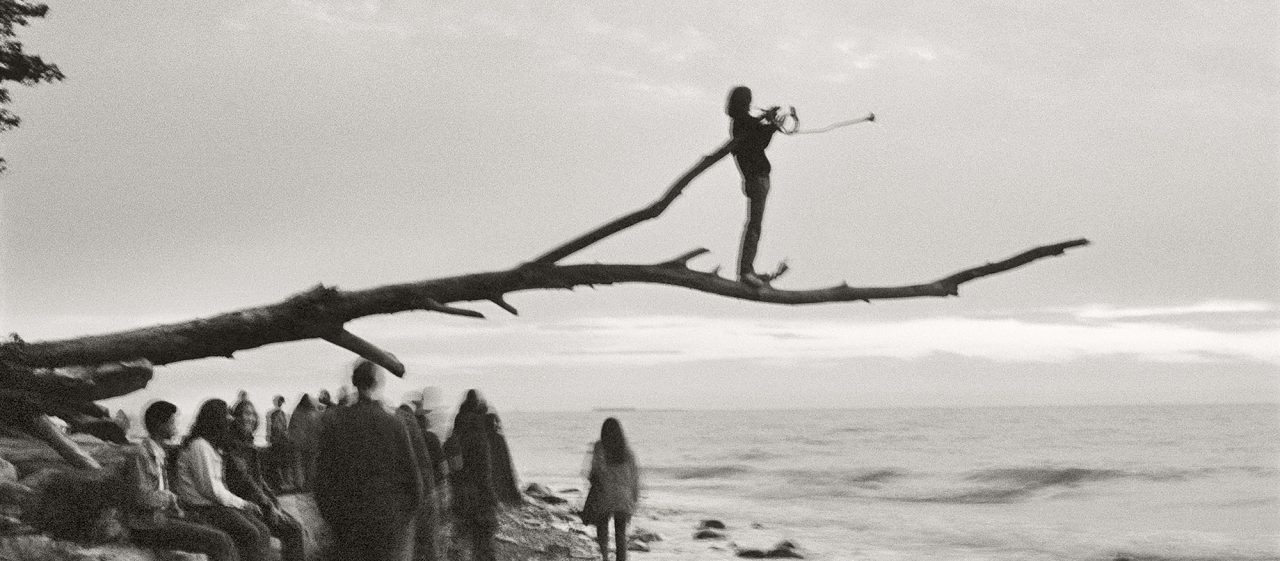
Please join us for a book launch and series of attendant events - readings, discussions, lectures - to celebrate the publication of our Beginning with the Seventies project. The program will take place on Friday, March 6 at the Musqueam Cultural Centre and Saturday, March 7 at the University Centre. Presenters include Lorna Brown, Lisa Darms, Thea Quiray Tagle, Kate Hennessy, Sarah Hunt, Yaniya Lee, Jaqueline Mabey, Allyson Mitchell and Lisa Robertson.
[more] -
Exhibition
4 September 2018 – 2 December 2018
Beginning with the Seventies: Collective Acts
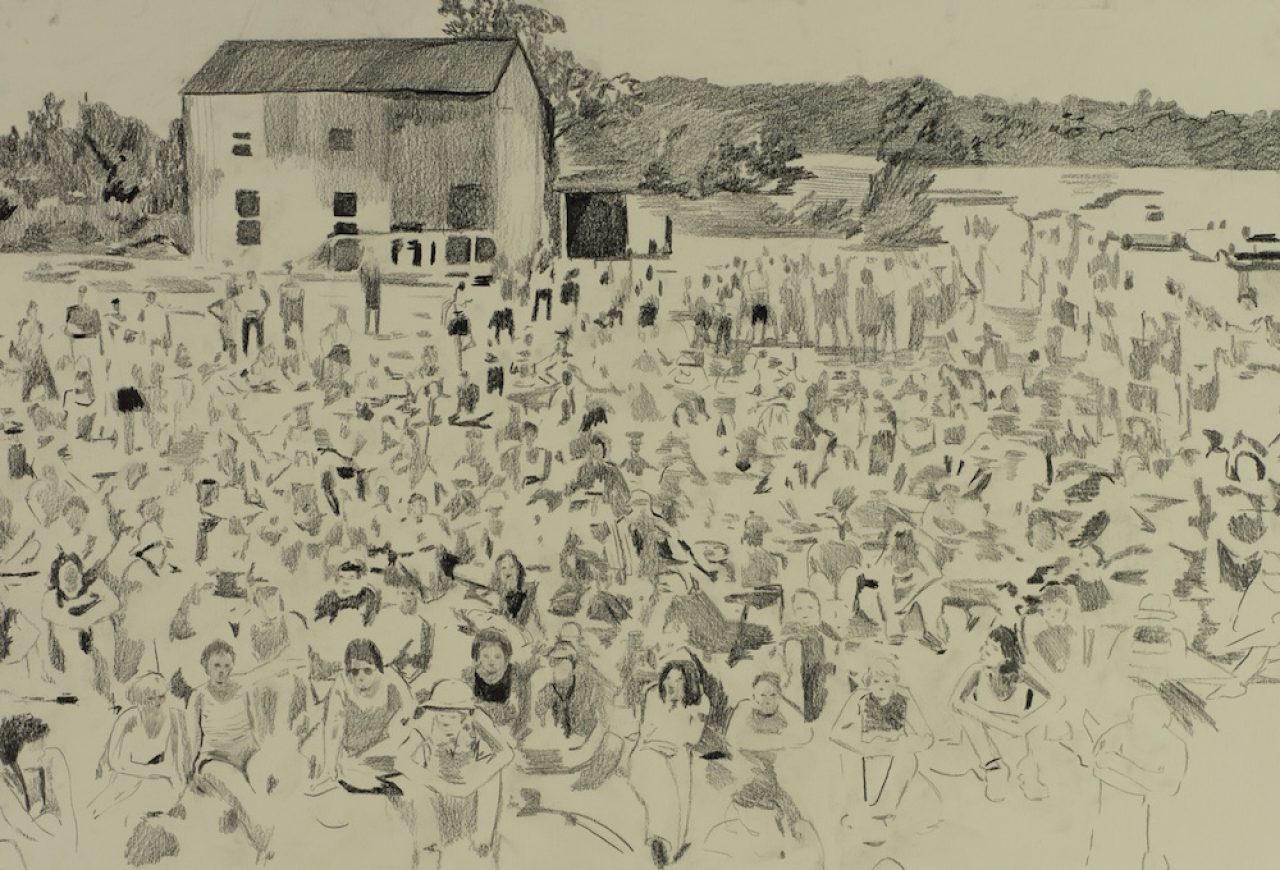
Collective Acts taps into the generative potential of archival research by artists into experiments with collective organizing and cooperative production, presenting new work by Dana Claxton, Jeneen Frei Njootli and the ReMatriate Collective, Christine D’Onofrio and Heather Kai Smith, alongside work by Salish Weavers Guild members Mary Peters, Adeline Lorenzetto and Annabel Stewart. Beginning with the Seventies: Collective Acts is curated by Lorna Brown and is the third of four exhibitions based upon the Belkin Art Gallery’s research project investigating the 1970s, an era when social movements of all kinds – feminism, environmentalism, LGBTQ rights, Indigenous rights, access to health services and housing – began to coalesce into models of self-organization that overlapped with the production of art and culture. Noting the resurgence of art practice involved with social activism and an increasing interest in the 1970s from younger producers, the Belkin has connected with diverse archives and activist networks to bring forward these histories, to commission new works of art and writing and to provide a space for discussion and debate.
[more] -
Exhibition
12 January 2018 – 8 April 2018
Beginning with the Seventies: GLUT

Celebrating the excessive abundance of the archive, Beginning with the Seventies: GLUT is concerned with language, depictions of the woman reader as an artistic genre and the potential of reading as performed resistance.
[more] -
Exhibition
22 June 2018 – 12 August 2018
Beginning with the Seventies: Radial Change
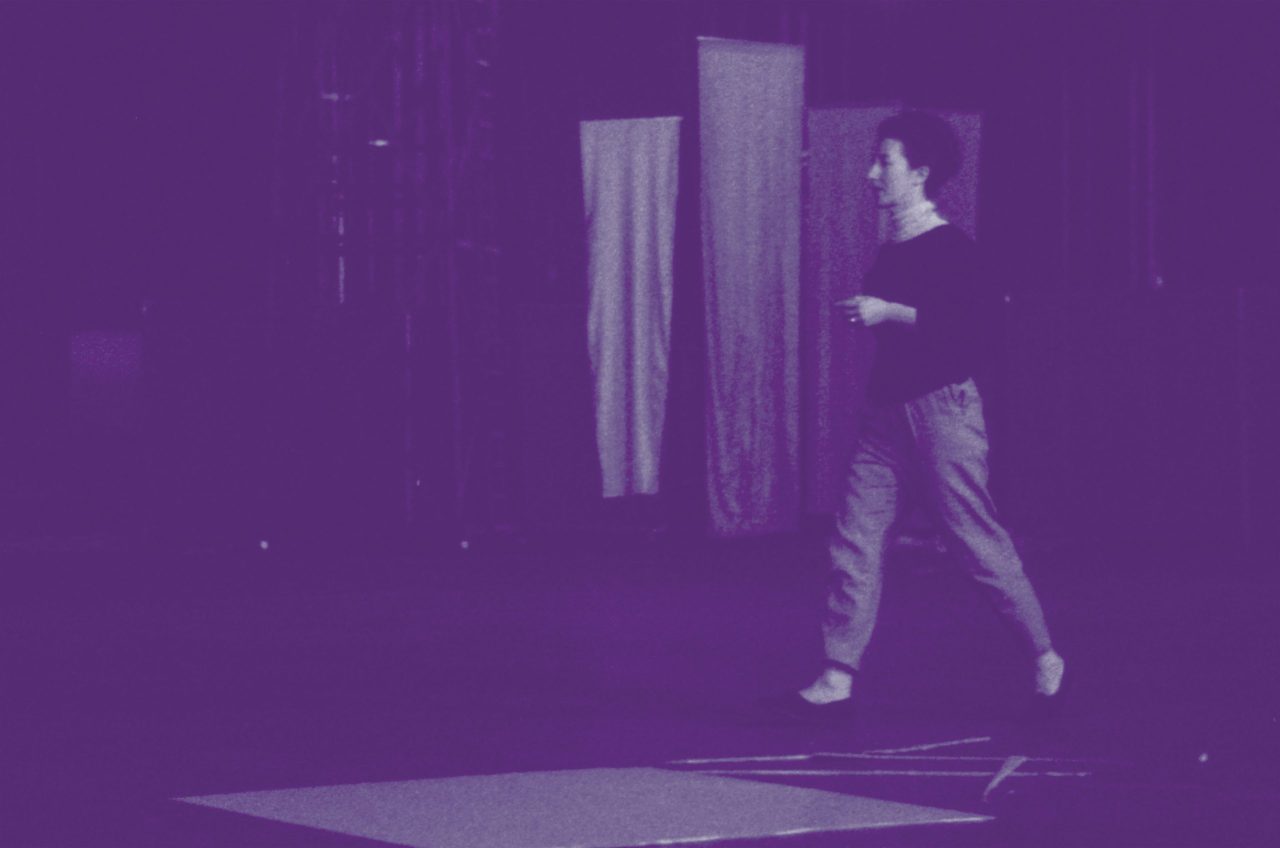
How is an archive formed? Memories of performance often exceed the containment of the document, whether photography, film, prop or testimony. As communities disperse and regroup over time, figures may slip away from the centre. Circling around the embodied archive, the exhibition Radial Change is drawn from the title of a dance work by Helen Goodwin. The elusive histories of Goodwin’s choreography and her influence on the interdisciplinary art scene of the 1970s are explored in new installation works by Evann Siebens and by Michael de Courcy.
[more] -
Exhibition
11 January 2019 – 7 April 2019
Hexsa’a̱m: To Be Here Always
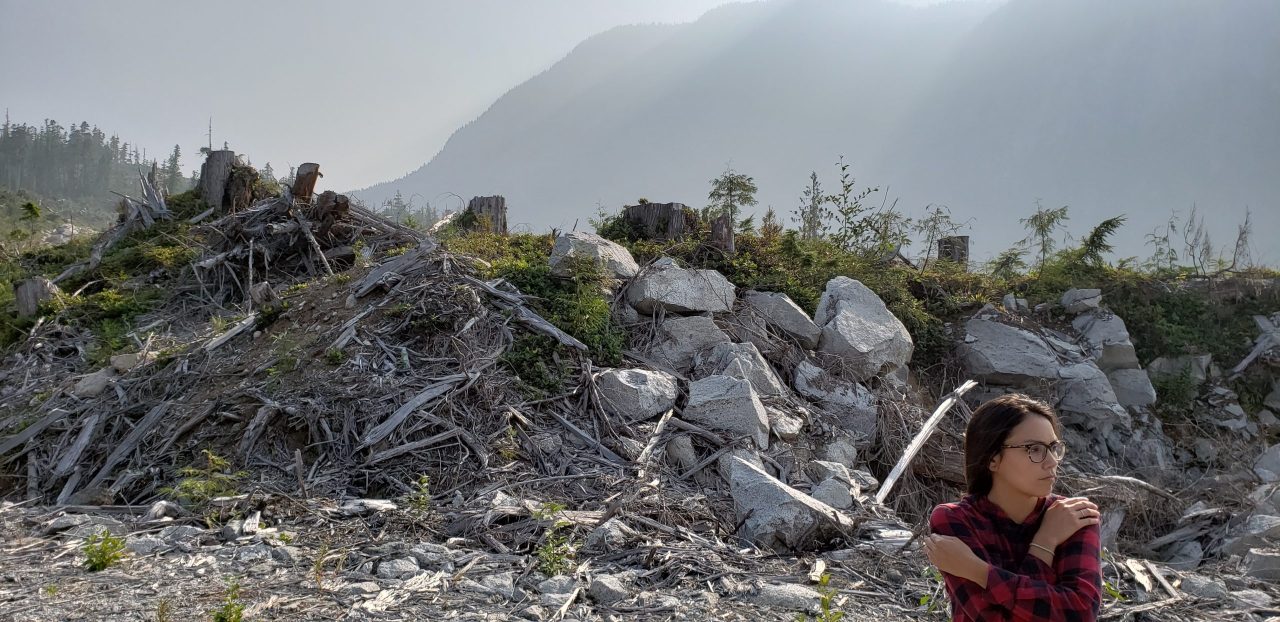
Working together at Kingcome Inlet in Summer 2018, a group of artists used film, video, social media, weaving, animation, drawing, language and song to address the urgent threats to the land and water. A manifestation of the relationships formed between the participants over this past year, Hexsa’a̱m: To Be Here Always is based on sharing knowledge and respectful collaboration. Simultaneously research, material, media, testimony and ceremony, the exhibit challenges the western concept that the power of art and culture are limited to the symbolic or metaphoric, and that the practices of First Peoples are simply part of a past heritage. As Marianne Nicolson states, “We must not seek to erase the influence of globalizing Western culture, but master its forces selectively, as part of a wider Canadian and global community, for the health of the land and the cultures it supports. The embodied practice of ceremonial knowledge relates to artistic experience – not in the aesthetic sense, but in the performative: through gestures that consolidate and enhance knowledge for positive change.” Hexsa’a̱m: To Be Here Always positions the gallery as an active location for this performance, drawing together many faculties and disciplines of the university in generative exchange.
[more]